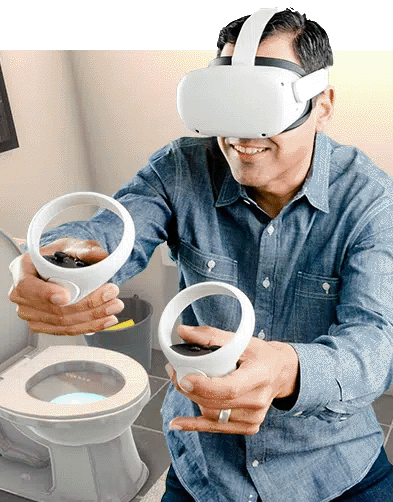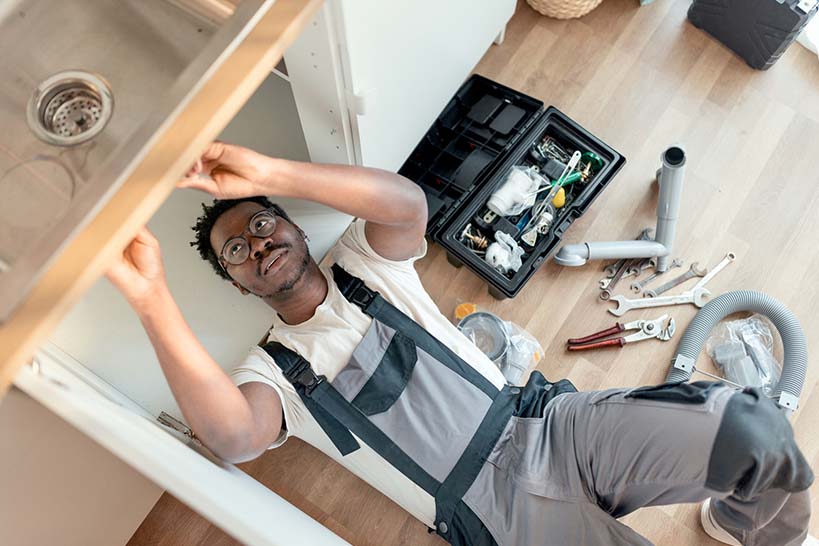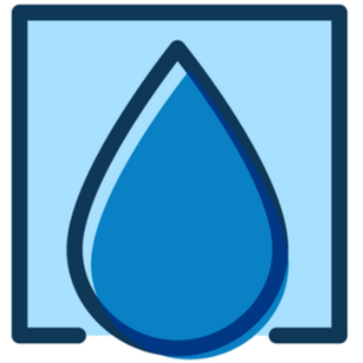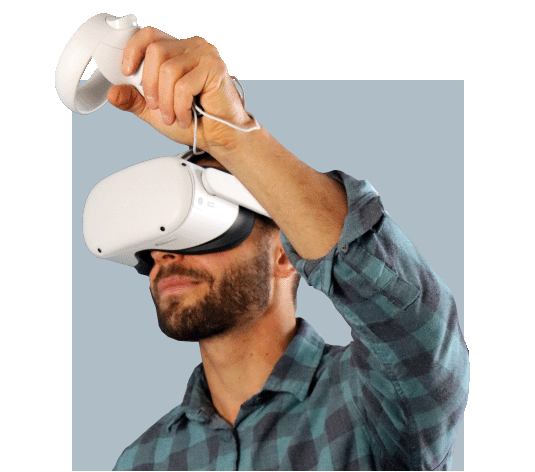Plumbing Technician
Looking for a career that is in demand and hands-on? Plumbing might be the ideal field for you.
High Quality VR-Based Plumbing Training
Train smarter and harder. Quickly gain the experience you need to become job-ready as a Plumbing Apprentice with state-of-the-art virtual reality skills training.

12 Weeks
Program Length
OSHA 10-Hour Construction
Certification

Issuing Authority

Career Insight
What does a Plumbing Technician do?
Installation of new plumbing systems
Interpret plans to ensure systems conform to building standards and codes
Provide emergency plumbing repair services
Troubleshoot and repair plumbing systems
42,600
PLUMBING APPRENTICES EACH YEAR IN THE US
Note: Salaries can vary widely depending on education, experience, employer, and even geographic area. Job and salary information is from ziprecruiter.com and the U.S. Department of Labor Statistics. Data is updated annually to reflect industry changes.
JOB OUTLOOK
Potential Career Paths
Plumbers in the installation, maintenance, and repair of plumbing systems. Their work is vital in residential, commercial, and industrial settings to ensure that plumbing systems operate properly and efficiently. Plumbing offers stability and demand for plumbers is expected to grow over the next 10 years. Plumbers enjoy competitive pay, hands-on and varied work experiences, as well as job flexibility and independence.
This course will prepare you to find a job as a Plumbing Apprentice and start your training as a fully licensed Plumber.
Individuals who complete this program and possess the subsequent certifications have the skills to find jobs as:
Plumbing Apprentice
Apprentice and Journeyman Pipefitter
Journeyman and Master Plumber
Apprentice and Journeyman Steamfitter
JOB OUTLOOK
Potential Career Paths
Plumbers in the installation, maintenance, and repair of plumbing systems. Their work is vital in residential, commercial, and industrial settings to ensure that plumbing systems operate properly and efficiently. Plumbing offers stability and demand for plumbers is expected to grow over the next 10 years. Plumbers enjoy competitive pay, hands-on and varied work experiences, as well as job flexibility and independence.
This course will prepare you to find a job as a Plumbing Apprentice and start your training as a fully licensed Plumber.
Individuals who complete this program and possess the subsequent certifications have the skills to find jobs as:
Plumbing Apprentice
Apprentice and Journeyman Pipefitter
Journeyman and Master Plumber
Apprentice and Journeyman Steamfitter
42,600
PLUMBING APPRENTICES EACH YEAR IN THE US
Note: Salaries can vary widely depending on education, experience, employer, and even geographic area. Job and salary information is from ziprecruiter.com and the U.S. Department of Labor Statistics. Data is updated annually to reflect industry changes.
Soft Skills Check
Do You Have What It Takes To Succeed?
Common Attributes of Successful Plumbing Technicians

Calm Under Pressure
Plumbers must have a cool head and steady hands to tackle tricky repairs in high-stress situations.
Coordination
Plumbers must possess an impressive degree of coordination to navigate tight spaces while using a wide range of tools.
Mechanical Aptitude
Plumbers need a thorough understanding of specialized tools and machinery to successfully tackle plumbing tasks.
Punctuality
Being punctual is a critical component when addressing emergency situations and ensuring problems are fixed quickly.
Physical Aptitude
Plumbing jobs often require plumbers to bend, kneel, and work in small or unique spaces.
Immersive VR Learning
- Explore real-world scenarios with interactive 3D simulations.
- Get unlimited, hands-on practice in a safe, virtual environment.
- Gain confidence and build your skills in a way not available in a typical classroom setting.


Train and Get Certified
- Prepare and review for your OSHA 10-Hour Certification exam while working through your Plumbing training curriculum.
- Provide potential employers with evidence of skills gained.
COURSE OVERVIEW
Plumbing Technician
Plumbing is one of the most constant industries for new jobs. This program prepares students for entry-level roles in the plumbing field. After completing the program, you will be able to perform general maintenance on plumbing systems, troubleshoot common plumbing issues, and gain an understanding of the common tools that are used in the plumbing trade.
After completing this 3 to 5-week online training, students will be prepared to be part of the Plumbing field and will receive a Plumbing Techncian Career Prep Professional Certificate of Completion. In addition, upon successful completion of the program, the student is prepared to sit for the following certification(s): OSHA 10-Hour Construction Industry.
Scheduling Details
Schedule: Coursework available 24/7
Total Course Hours: 95
Estimated Completion Time:
Flexible scheduling…You decide how quickly you want to get certified.
- Students who commit 20 hours/week can complete in 3 weeks.
- Students who commit 10 hours/week can complete in 5 weeks.
Maximum time to complete: Students have access to the online course materials for 12 months.
Instruction & Evaluation Strategies
- Self-directed study
- Skills demonstrations, simulations, and online activities to aid learning
- Quizzes and Exams
The majority of this course will be conducted through drill exercises and related learner-centered practice activities and quizzes based on the knowledge you have gained through completing each chapter. Be prepared for a thorough, and extensive hands-on experience.
Books and Materials Used:
No books necessary for this course. All materials are on-line.
Outline/Lessons
Module 1: How Does Plumbing Work
In this module, you will learn the basics of how plumbing works. You will discover the two different plumbing systems,
how they work, and how they are set up in a building. This module also covers basic plumbing tools, plumbing safety and
the basic math skills you will need for this trade.
Module 2: Plumbing Basics
In this module, you will learn about different types of pipes such as potable water piping, sanitary drainage, and fuel gas
piping. A brief overview of the general plumbing codes you may encounter will be covered. You will also learn the
procedures for removing common bathroom and kitchen fixtures. Lastly, this module will provide you with the knowledge
necessary to prevent serious injuries as a result of falls.
Module 3: Pipe Joining and Repair
In this module, you will learn the various types of joining methods for plastic tubing and piping. It will also cover how to
repair leaks and damages of the plastic pipes, galvanized, copper, and copper DWV piping, and cast iron fittings in
different parts of the home.
Module 4: Plumbing Fixtures and Fittings
In this module, you will learn all the materials, configurations, and components of various plumbing fixtures. You will also
discover the installation of four common plumbing fixtures. This module will give guidance on how to choose the right
trim parts to make sure your fixture works effectively as it is intended to. Different kinds of caulk and what they are used
for are also covered. You will also learn about the pipe supports behind every plumbing system. Lastly, you will explore all
of the different pipe fittings and the vital role they play in a well-functioning plumbing system.
Module 5: Plumbing Fixture Troubleshooting and Replacement
In this module, you will learn the skills necessary to tackle plumbing maintenance. You will be provided with a drain
cleaning overview and procedures. This module also covers how to diagnose and repair 5 of the most common problems
that occur with a toilet. Lastly, you will learn how to troubleshoot the 4 most common problems with a kitchen sink.
Module 6: Electrical for Plumbing
In this module, you will learn the major fundamental electrical concepts and how they relate to one another. You will also
be introduced to a multimeter and how to use it. You will be provided with the essential knowledge necessary to stay
safe in the electrical field.
Module 7: Water Heaters
In this module, you will learn the components, setup, and function of gas, electric, and tankless water heaters. You will also
be introduced to how to install and maintain the different types of water heaters.
Upon successful completion students will be able to:
- Explain what a plumbing system is, and the basic safety and tools related to it.
- Identify the parts and tools used for the electrical component of the plumbing system.
- Describe the different types of water heaters and how to install and service them.
- Explain basic plumbing codes that are used.
- Describe the different types of pipes and fittings.
- Explain the various types of plumbing fixtures and their role in the plumbing system.
- Summarize troubleshooting and maintenance for toilets and kitchen sinks.
Find Your Fit
Talk With an Expert
When choosing a school, it’s important to consider how it will fit in with your life. You’ll need the right program, the right funding, and the right resources and support to help you succeed.
In addition to offering comprehensive student support dedicated to helping you reach your goals, NTI’s online programs work within your schedule. Call today at (469) 930-2404 to connect with an advisor or fill out the form below. We’re here to help!
